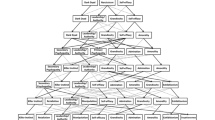Abstract
John DePoe has criticized the self-defeat argument for Phenomenal Conservatism. He argues that acquaintance, rather than appearance, may form the basis for non-inferentially justified beliefs, and that Phenomenal Conservatism conflicts with a central motivation for internalism. I explain how Phenomenal Conservatism and the self-defeat argument may survive these challenges.
Similar content being viewed by others
Notes
See my (2001, pp. 98–115) and (2007a) for elaboration. The “relevant” beliefs are beliefs that are not based upon self-deception, faith, or the like. I assume that beliefs based upon self-deception, etc., are not plausible candidates for being epistemically justified. I assume also that only if PC is true can appearances be a source of justification, because PC, as formulated in the text here, seems to be the weakest view worth considering that attributes justificatory force to appearance. See my (2007a) for discussion of views that attribute justificatory power to only some appearances.
DePoe (2010).
I assume familiarity with both Phenomenal Conservatism and the Acquaintance Theory here. On the Acquaintance Theory, see Russell (1997, Chaps. 5, 9), Fumerton (1995, pp. 73–79). On Fumerton’s view, acquaintance is a relation between a person and the object of acquaintance, and unlike appearances, it is not an intentional state.
The Simple Acquaintance Theory is probably Russell’s view. The Triple Acquaintance Theory is the view of both Fumerton and DePoe.
Fumerton (2005, p. 123) cites a similar case as one in which a subject has a pain without being acquainted with it.
Churchland (1988, pp. 77–8).
BonJour (1985, p. 41).
The distinction between undercutting and rebutting defeaters derives from Pollock and Cruz (1999, pp. 196–197), though I have given a broader characterization of undercutting defeaters than theirs.
Huemer (2007b, forthcoming).
BonJour (1985, pp. 43–44), emphasis BonJour’s.
See Fumerton (1995, pp. 60–66) for discussion of the meaning of “internalism”, including an alternate characterization of the view. See also my (2006), where I propose another definition of internalism: internalism is the view that what one has justification for believing supervenes on the way things appear to one.
This argument is explained and defended in my (2006).
See my (2007a, pp. 47–48).
I would like to thank John DePoe and an anonymous referee for Philosophical Studies for helpful comments on the manuscript.
References
BonJour, L. (1985). The structure of empirical knowledge. Cambridge, MA: Harvard University Press.
BonJour, L. (2001). Toward a defense of empirical foundationalism. In M. DePaul (Ed.), Resurrecting old-fashioned foundationalism (pp. 21–38). Lanham, MD: Rowman and Littlefield.
Churchland, P. M. (1988). Matter and consciousness: A contemporary introduction to the philosophy of mind, revised ed. Cambridge, MA: MIT Press.
DePoe, J. M. (2010). Defeating the self-defeat argument for phenomenal conservativism. Philosophical Studies. doi:10.1007/s11098-009-9482-7.
Descartes, R. (1984). Meditations on first philosophy. In J. Cottingham, R. Stoothoff, & D. Murdoch (Eds.), The philosophical writings of Descartes (Vol. 2). Cambridge: Cambridge University Press.
Fumerton, R. (1995). Metaepistemology and skepticism. Lanham, MD: Rowman and Littlefield.
Fumerton, R. (2005). Speckled hens and objects of acquaintance. Philosophical Perspectives, 19, 121–138.
Huemer, M. (2001). Skepticism and the veil of perception. Lanham, MD: Rowman and Littlefield.
Huemer, M. (2006). Phenomenal conservatism and the internalist intuition. American Philosophical Quarterly, 43, 147–158.
Huemer, M. (2007a). Compassionate phenomenal conservatism. Philosophy and Phenomenological Research, 74, 30–55.
Huemer, M. (2007b). Moore’s paradox and the norm of belief. In S. Nuccetelli & G. Seay (Eds.), Themes from G. E. Moore (pp. 142–157). Oxford: Oxford University Press.
Huemer, M. (Forthcoming). The puzzle of metacoherence. Philosophy and Phenomenological Research.
Kriegel, U. (2009). Subjective consciousness: A self-representational theory. Oxford: Oxford University Press.
Pollock, J., & Cruz, J. (1999). Contemporary theories of knowledge (2nd ed.). Lanham, MD: Rowman and Littlefield.
Quinn, W. (1990). The puzzle of the self-torturer. Philosophical Studies, 59, 79–90.
Russell, B. (1997). The problems of philosophy. New York: Oxford University Press. (Originally published 1912).
Williamson, T. (2000). Knowledge and its limits. Oxford: Oxford University Press.
Author information
Authors and Affiliations
Corresponding author
Rights and permissions
About this article
Cite this article
Huemer, M. Phenomenal conservatism and self-defeat: a reply to DePoe. Philos Stud 156, 1–13 (2011). https://doi.org/10.1007/s11098-010-9584-2
Published:
Issue Date:
DOI: https://doi.org/10.1007/s11098-010-9584-2



